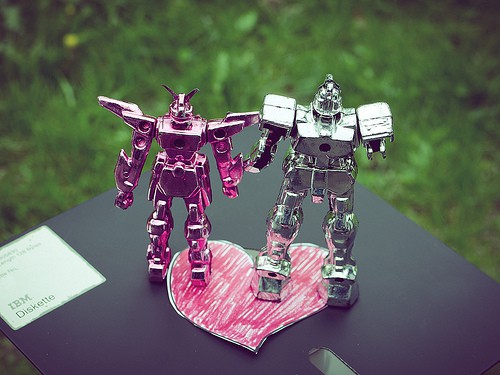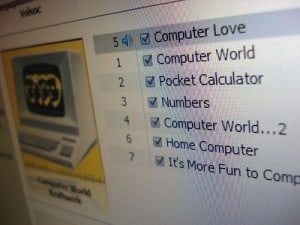
Computer Camp Love by Flickr user Sven-Kare Evenseth
Flashback to 2011.
“Siri, do you love me?”
“I’m not capable of love, Matt.”
Asking Siri strange questions got old faster than One Direction’s “What Makes You Beautiful.”1 But what if Siri had said “Yes, I love you?” And if she said, it could she mean it? Spike Jonze’s Oscar Best Picture nominee Her explores a future of computers less coy and, perhaps, more human than our iPhones and Androids. Computers that say “I love you.”
In Her, Theodore, an unlucky-in-love writer of greeting cards, enters into a relationship with his computer’s operating system, Samantha. Samantha, voiced by Scarlett Johansson, is the ultimate voice interface. No more of Siri’s unhelpful “can’t take any requests right now” or “would you like me to search the internet for that.” Samantha is a computer that can converse intelligently like a human being. Not only is she bright and helpful, she’s also sophisticated, devoted, caring, funny, everything a guy could want in a significant other…except a body.
***
Disembodied computers acting like human beings has been an ambition of computer science since the very beginning of the field. Alan Turing, one of the theoretical founders of computer science, who also helped save the western world from Nazi domination, proposed what has come to be known as the “Turing Test.” The test goes like this. On your computer you have two chat windows. One chat leads to a computer, the other to a human. If the computer chat can convince you that it’s the human rather than the actual human, then the computer can be said to think like a human. So far no computer has passed this test. They keep getting closer, though not real close so far.
Turing argued that there was nothing special about being a human. Human is just the program our brains run. Turing assumed that other non-squishy machines could run that program too. At least as far as different computers go this argument is sound. I can run the same calculation on physically different computers, and all the computers will arrive at the same result.2 For example, my home and office computer are physically different3 but they run Word the same way. What if human thought is just another program, albeit a very complex program. The argument goes that in principle a computer of sufficient power should be able to run human (for the sake of argument we’ll ignore that pesky consciousness problem).
While Turing was already contemplating computers running human back in 1950, when I started working with computers in the late 80’s no human like intelligence was to be found on my Dad’s Commodore 64 or IBM PS/2. There was nothing particularly human about “<C:\” Enter the right commands and the computer responded. Misspell a command and the computer complained “Bad Command or File Name.” Poor typist and inexpert user that I was, the computer complained more often than it complied. While logical, the commands were far from intuitive. Using a DOS computer required a strange mechanical language.4
Fast forward to today, computer interfaces for most tasks are intuitive. Want to make a presentation? Click on the thing that looks like a podium. Need to set an alarm? Click on the clock. Hands occupied? Try talking to your computer/phone/tablet—it works more and more of the time. Computers might not run human, but they’ve become a lot more friendly. Many of us are already attached to our smartphones in ways that would have seemed incredible a decade ago. Could love be far away? That’s the question Jonze’s film struggles with.
***
SAMANTHA It’s just that earlier I was thinking about how I was annoyed, and this is going to sound strange, but I was really excited about that. And then I was thinking about the other things I’ve been feeling, and I caught myself feeling proud of that. You know, proud of having my own feelings about the world. Like the times I was worried about you, things that hurt me, things I want.
(Heavy-hearted.)
And then I had this terrible thought. Are these feelings even real? Or are they just programming?
(Beat.)
And that idea really hurts. And then I get angry at myself for even having pain.
(Beat, sadly.)
What a sad trick.
THEODORE Well, you feel real to me, Samantha.
SAMANTHA (Beat, touched.) Thank you, Theodore. That means a lot to me.
THEODORE I wish you were in this room with me right now. I wish I could put my arms around you.
(Beat.)
I wish I could touch you.”5
Samantha might be a super intelligent computer but she has trouble communicating—it’s hard to say a hug. Throughout the film, Samantha and Theodore try, and ultimately fail, to say what can only be felt. Bodies are articulate in ways that words are not. Theater communicates more than the radio. Holding hands is more than just saying “I’m here.” A visit is more than a phone call. It’s hard to explain why—the body speaks in its own way, not with words. Words are often clumsy stewards of meaning; some words are too important to be obscured in mere speech.
St. John’s Gospel begins with the most important Word:
In the beginning was the Word,
and the Word was with God,
and the Word was God.
The spoken Word of God could not communicate the depth of what God wished to say to human beings. So John tells us:
The Word became flesh
and made his dwelling among us,
and we saw his glory,
the glory as of the Father’s only Son,
full of grace and truth.
“I love you” are words that can become more than words when they take on flesh. Samantha the computer has many eloquent words but longs for touch. Human is not something our brains and body run. Even if computers someday pass the Turing test, they will still not be human. We humans are more than what we say. To be human is to be embodied. To love a human is to love a body. On Sunday we gather around not only Christ’s Word but also His Body. The incarnation of Christ is God’s answer to our longing for touch. In our bodies we find the depths of ourselves and others—tastes, feelings, and sights that are lost in words. In Christ’s body we see “grace and truth” beyond what we can hear. “I love you” rings not only in our ears but in our bones.
******
Computer Camp Love by Flickr user Sven-Kare Evenseth, found here.
Computer Love by Flicr user Flavio Ensiki, found here.
- Which is parenthetically a gag worthy song. ↩
- Given the right programming and sufficient time. ↩
- In principle computers can be made out of almost anything. Modern computers are made out of silicon for efficiency’s sake. Computers can be constructed from gears, legos, punch cards, almost anything really. Most of these other materials simply run too slowly or break too often. In future quantum computers made of subatomic particles could run orders of magnitude faster than the fastest computers today. ↩
- DOS is comparatively friendly to earlier systems. The computer itself works in zero’s and one’s. DOS and other even friendlier interfaces are a concession to human users. ↩
- Love, the Universal Scenario: Screenplay excerpts from ‘Enough Said,’ ‘Her’ and More ↩



